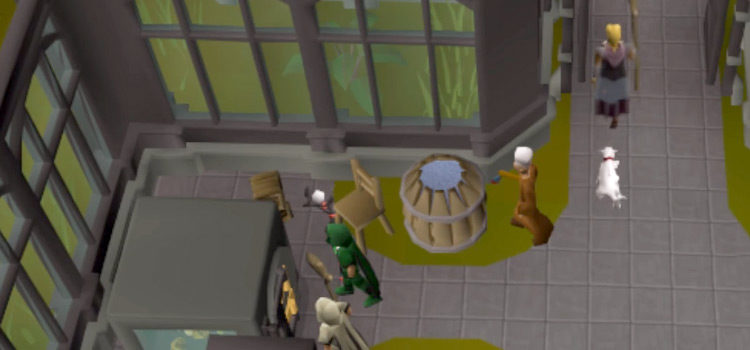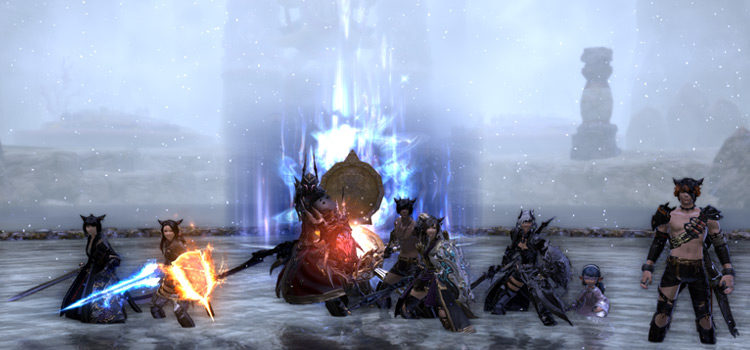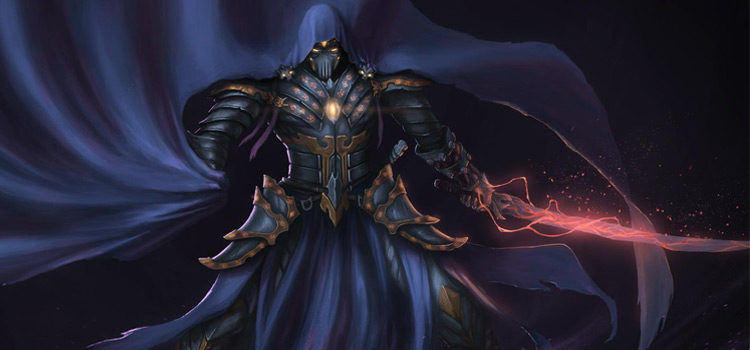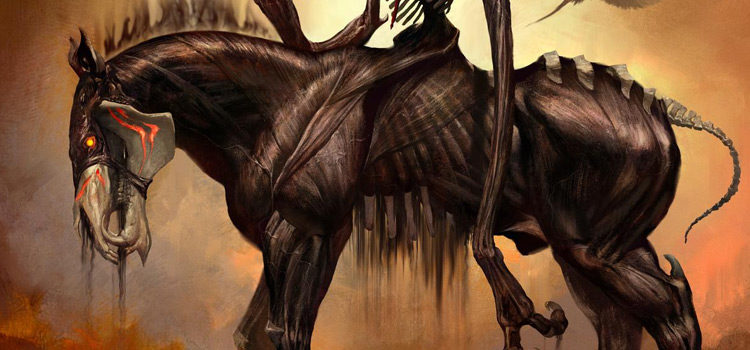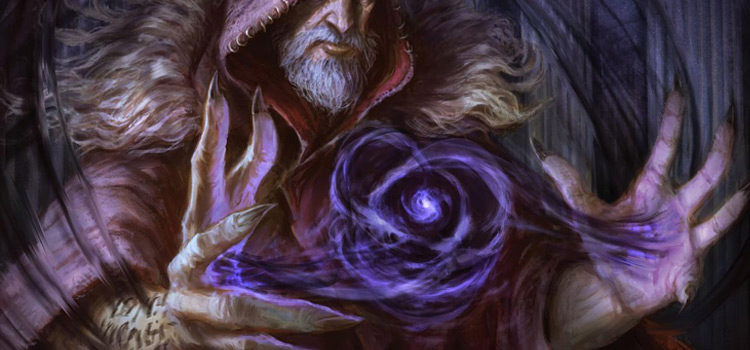Divine Word: D&D 5e Spell Guide
This post may contain affiliate links. If you buy something we may get a small commission at no extra cost to you. (Learn more).
It’s always fun to play a caster and whip out a high level spell.
While arcane casters get flashy damaging spells like meteor swarm, divine casters have a number of fun spells of their own.
Let’s take a look at one of the decently powerful cleric spells: divine word.
Divine Word Spell Details
Type: 7th Level Evocation
Casting Time: 1 Bonus Action
Range: 30 Feet
Components: V
Duration: Instantaneous
The spell allows you to target any creatures of your choice within 30 feet of you. These creatures have to be able to hear you, but it doesn’t matter if you can see them.
The spell forces a Charisma saving throw, which is quite nice. Many enemy creatures you fight in D&D have low Charisma scores, or don’t have proficiency in Charisma saving throws.
The spell’s effects depend on how many hit points a target has.
- Between 50 and 41 HP, the target is deafened for a minute.
- Between 40 and 31 HP, the target is deafened and blinded for ten minutes.
- Between 30 and 21 HP, the target is deafened, blinded, and stunned for one hour.
- At 20 HP or lower, the target is killed instantly.
In addition, celestials, elementals, fey, and fiends that fail on the Charisma saving throw are sent back to their home plane (the Feywild, the Plane of Fire, Hell, the Abyss, etc.). This only works if the creature isn’t already on their home plane when you cast the spell.
These creatures are banished no matter what their current hit points are.
A banished creature can’t return to the plane you expelled it from until 24 hours have passed, or until they use a wish spell to overcome it.
Who Gets It?
As a 7th-level spell, divine word is a lot more exclusive than some other spells in D&D.
Divine word is on the cleric spell list, so all clerics have access to it.
Since it’s on the cleric spell list, divine word can also be learned by Divine Soul sorcerers. This sorcerer subclass can select spells from both the sorcerer and cleric spell lists, which makes it relatively popular among players.
You can find the Divine Soul in Xanathar’s Guide to Everything.
As always, bards can learn the spell by choosing it with their Magical Secrets feature.
Divine Word Uses
Divine word is relatively straightforward. You speak a word, your targets make the saving throw, and you get to debuff them if they fail.
The challenge to using divine word is picking the right time to use it.
In most games, the players won’t know how many hit points a creature has. There are ways to find out, including the Battle Master fighter’s Know Your Enemy ability.
Methods like the Know Your Enemy feature may not always be available. You may not have a Battle Master in your party, or they might not have a chance to use their ability.
If you have a DM that makes the monster’s hit points visible to the players, that’s a big help when using divine word.
Many DMs don’t give exact hit point counts, however, leaving you in a position of having to guess how effective your divine word will be.
Surrounded By Mobs
One excellent time to use a spell like divine word is when you are attacked by hordes of weaker creatures.
Divine word can be learned as early as 13th level. While most of the monsters you face by that point will have more than 50 hit points, that might not always be the case.
Spells like animate objects create a number of creatures with low hit points, and evil necromancers with armies of undead may only be able to control a limited number of zombies or skeletons.
If you can manage to get into the thick of a horde, a divine word spell might be enough to wipe out a significant number of weaker enemies at once.
For the animate objects spell, tiny objects only have 20 hit points, and would be destroyed instantly. Small objects have 25 hit points, which would subject them to the stunned condition if they fail the spell.
All the objects animated by the spell have a Charisma of 1, making them very vulnerable to divine word.
Weaker undead are equally vulnerable. Both zombies and skeletons created by the animate dead spell have negative modifiers to Charisma, making them likely to fail the save.
Skeletons have low hit points and would be killed instantly on a failure, even at maximum hit points. Zombies have slightly more in the way of HP, but even they would be instantly stunned.
Banishing
The simple answer is that divine word is often best when used against hordes of outsiders.
If you end up surrounded by fey, fiends, celestials, or elementals, the divine word spell is a lovely way to banish as many of them as you can at once.
Since the banishing effect doesn’t rely on their current number of hit points, it’s a reliable use of the spell that can take opponents immediately out of the fight.
This won’t work on anything that has legendary resistances, and several powerful fiends, fey, celestials, and elementals are resistant to magic. Many of them would have advantage on the Charisma save.
Several of the middle-tier fiends and other outsiders do have decent Charisma scores and Charisma save bonuses. It’s not a guarantee that you’ll be able to banish them.
The spell is still best used on large numbers of weak enemies.
Plus, many weaker creatures don’t have good Charisma saves. When used against large numbers of them, there’s still a good chance to get rid of many of them with a single spell.
Even better, divine word doesn’t require concentration. Unlike the banishment spell, you won’t have to worry about something damaging you and bringing the monster back if your concentration ends.
Spell Tips and Tricks
For a few tools of the trade to keep in mind, check out these ideas.
The right strategies can make or break parts of your campaign, especially how(and when) you’re using certain spells.
Changing Shapes
Divine word has some interesting effects when used along with spells like polymorph.
Like the 9th-level spell power word kill, divine word has a chance of instantly killing a creature if it has below 20 hit points.
This comes in handy when facing creatures that tend to switch between forms that have their own hit points.
Creatures under the various polymorph spells, the shapechange spell, and effects like the druid’s Wild Shape ability are all vulnerable to this kind of attack.
Divine word doesn’t reduce a creature to 0 hit points. It simply kills them, so long as they have 20 hit points or fewer.
This means that creatures polymorphed into some other form with its own hit points won’t change back after death. They’ll simply die in the form they’re in.
This can be used to end some powerful creatures, assuming you are able to affect them with the polymorph spell. By turning them into something with low hit points, like a frog, you open them up to being insta-killed by the divine word spell.
If your DM decides to rule differently on how the spell works, you’re not out of luck.
Stunning
If the DM decides that a killed creature is still turned back to their regular form, you can still use divine word to great effect.
Simply pick a creature with more than 20 hit points, but less than 30. While the creature won’t be instantly killed, it will be stunned for one hour, with no more saves against the stunned effect.
Each round in combat is 6 seconds. That means 1 minute of combat is about 10 rounds. A creature stunned for 1 hour would be stunned for effectively 600 rounds, giving you plenty of time to take it out.
Unless the target is one of the relatively few creatures that is immune to being stunned, the stunned effect should last even after the polymorph spell ends.
The general ruling for conditions is that they last even when you change form. Some forms might make you immune to a certain condition, but that’s when the DM’s ability to make on-the-spot rules calls comes into play.
DM Uses
For DMs running evil clerics, this can be a handy trick when facing druid PCs, especially Circle of the Moon druids.
20th-level druids have the Archdruid ability, which allows them to use Wild Shape an unlimited number of times.
Since Circle of the Moon druids can Wild Shape as a bonus action and have more powerful Wild Shape forms they can pick, the Archdruid feature allows them to effectively heal themselves to full hit points every turn.
Spells like divine word and power word kill don’t care about those hit points, however. So long as the creature is below the hit point threshold, the effects still happen if they fail their save.
Because of the insta-kill effect, the druid won’t turn back into their true form.
The druid will simply be killed by the spell.
Divine word isn’t as helpful for this strategy as power word kill. But it can still be useful in a pinch.
